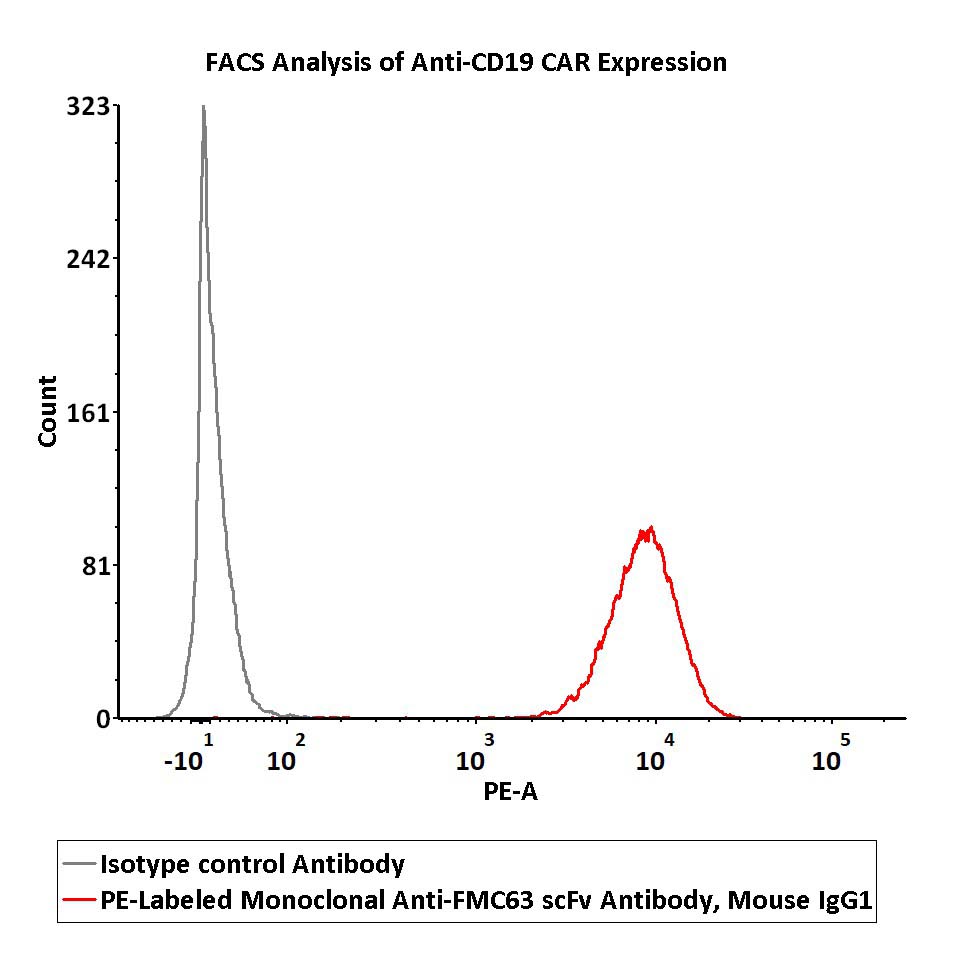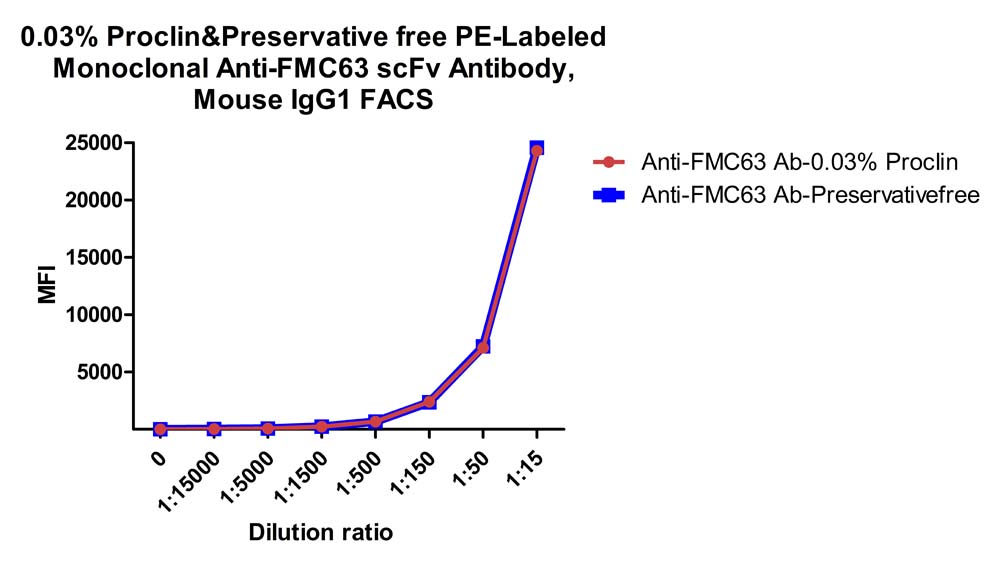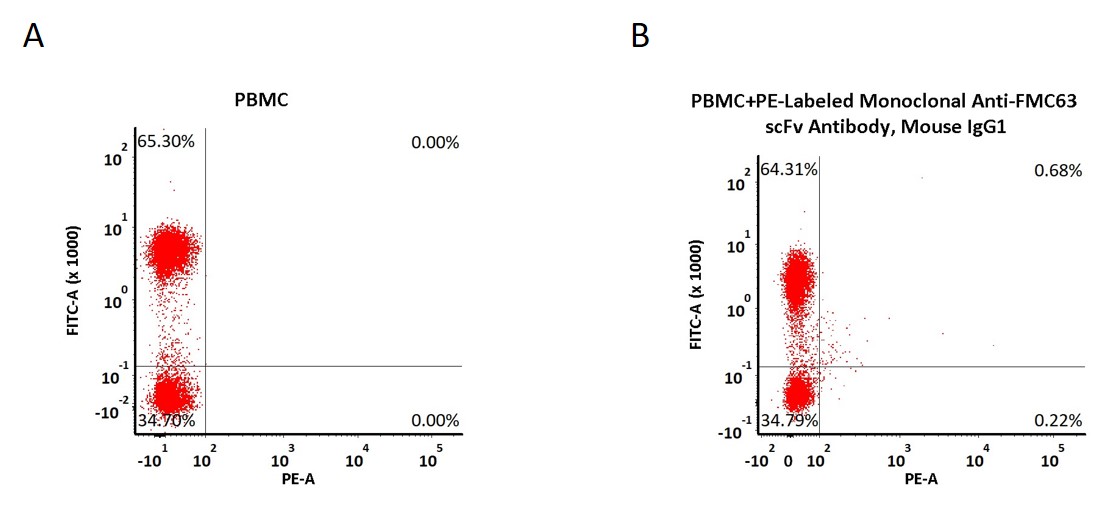抗体来源(Source)
PE-Labeled Monoclonal Anti-FMC63 Antibody, Mouse IgG1 is produced via site-specific conjugation of PE to Monoclonal Anti-FMC63 Antibody, Mouse IgG1 under optimal conditions with a proprietary technology.
We carry another premium grade PE-Labeled Monoclonal Anti-FMC63 Antibody, Mouse IgG1 (Y45) (FM3-PY54G0), produced with the same production process but under more rigorous quality control system that incorporates a comprehensive set of tests including sterility and endotoxin tests. It is designed for cell isolation and cell culture applications in the early preclinical stage.
应用(Application)
Flow Cytometry (Evaluation of Anti-CD19 (FMC63 scFv) CAR Expression). Please note that this product is NOT compatible to streptavidin detection system.
克隆号(Clone)
Y45
种属(Species)
Mouse
亚型(Isotype)
Mouse IgG1 | Mouse Kappa
特异性(Specificity)
Specifically recognizes the antigen-recognition domain of FMC63 derived CARs.
免疫原(Immunogen)
Recombinant FMC63 scFv derived from HEK293 cells.
偶联(Conjugate)
PE
Excitation Wavelength: 488 nm / 561 nm
Emission Wavelength: 575 nm
同型对照(Isotype Control)
The Isotype control is sold separately and you can search for Cat. No. DNP-PM1 for product information.
推荐稀释比(Recommended Dilution)
1:50
制剂(Formulation)
Lyophilized from 0.22 μm filtered solution in PBS, 0.5% BSA, 0.03% Proclin, pH7.4 with trehalose as protectant.
Contact us for customized product form or formulation.
重构方法(Reconstitution)
Please see Certificate of Analysis for specific instructions.
For best performance, we strongly recommend you to follow the reconstitution protocol provided in the CoA.
存储(Storage)
For long term storage, the product should be stored at lyophilized state at -20°C or lower.
Please protect from light and avoid repeated freeze-thaw cycles.
This product is stable after storage at:
- -20°C to -70°C for 24 months in lyophilized state;
- -70°C for 12 months after reconstitution;
- 2-8°C for 12 months after reconstitution.
活性(Bioactivity)-FACS

5e5 of anti-CD19 CAR-293 cells were stained with 100 μL of 1:50 dilution (2 μL stock solution in 100 μL FACS buffer) of PE-Labeled Monoclonal Anti-FMC63 Antibody, Mouse IgG1 (Cat. No. FM3-PY54A2) and isotype control antibody respectively. PE signal was used to evaluate the binding activity (QC tested).
Protocol

Binding activity of the PE-Labeled Monoclonal Anti-FMC63 Antibody, Mouse IgG1 before and after adding 0.03% Proclin was evaluated in the above FACS analysis. The result shows that PE-Labeled Monoclonal Anti-FMC63 Antibody, Mouse IgG1 (Cat. No. FM3-PY54A2) and PE-Labeled Monoclonal Anti-FMC63 Antibody, Mouse IgG1 (Cat. No. FM3-HPY53) have the same binding activity against anti-CD19 CAR-293 cells.
Protocol

Non-specificity of PE-Labeled Monoclonal Anti-FMC63 scFv Antibody, Mouse IgG1 (Y45) (Cat. No. FM3-PY54A2) binding to CD3+ cells present in human PBMC. Human PBMCs were simultaneously stained with FITC-labeled anti-CD3 antibody and PE-Labeled Monoclonal Anti-FMC63 scFv Antibody, Mouse IgG1 (Y45) (2 μL of the antibody stock solution corresponds to labeling of 5e5 cells in a final volume of 100 µL), washed and then analyzed with FACS. Both FITC and PE positive signals was used to evaluate the non-specific binding activity to human CD3+ cells (QC tested).
Protocol
CAR阳性表达率检测(Evaluation of CAR expression)
FACS Analysis of Non-specific binding to Human whole blood

Non-specificity of PE-Labeled Monoclonal Anti-FMC63 Antibody, Mouse IgG1 (Y45) (Site-specific conjugation) (0.03% Proclin) (Cat. No. FM3-PY54A2) binding to CD3+ cells present in human whole blood. 100 μl of human whole blood were simultaneously stained with APC/Cyanine7 anti-human CD3 Antibody and PE-Labeled Monoclonal Anti-FMC63 Antibody, Mouse IgG1 (Y45) (2 μL of the antibody stock solution in a final volume of 100 µL), compared with isotype control antibody and positive control antibody. Both APC/Cyanine7 and PE positive signals was used to evaluate the non-specific binding activity to human CD3+ cells.
背景(Background)
FMC63 is an IgG2a mouse monoclonal antibody specific for CD19, which is a target for the immunotherapy of B lineage leukaemias and lymphomas. FMC63 scFv is the most commonly used ectodomain component of CD19-specific CARs. So far, most of reported CART19 trials contain the anti-CD19 scFv derived from FMC63, including the two FDA-approved CARs Kymriah and Yescarta.























































 膜杰作
膜杰作 Star Staining
Star Staining












